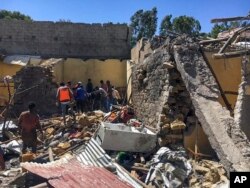Some of the more than 70,000 Ethiopians who fled to Sudan during the two-year war in the Tigray region are hoping to return home soon, as a November peace deal between Ethiopian federal forces and the Tigray People's Liberation Front appears to be holding.
However, many of those refugees are skeptical the peace will last.
Tigrayan Tesfai Gabriel-Mariam, who is 61, fled Ethiopia's civil war to Sudan's Um Rakuba refugee camp two years ago after his wife was killed in the fighting. He has since lived with his two grandchildren in a makeshift shelter.
The peace deal has raised hopes they may be able to return home soon, but Tesfai says he worries about their safety amid reports that people are still being killed.
Rights groups say hundreds of thousands of Tigrayans were pushed out of their homes in what amounts to ethnic cleansing — a notion that Ethiopian authorities reject.
Even if their safety was guaranteed, it's not clear what Tigrayan refugees like Tesfai would have left if they returned home. Tesfai worked as a grocer in Tigray's capital, Mekelle, but says his shop was looted during the war.
His story and fears are echoed by other Tigrayans living in Um Rakuba.
Muluk Garsihar, a 58-year-old mother of four, also arrived at the camp two years ago. She says life as a refugee has been difficult, and she wants to return to Tigray if there is peace. However, she doesn't know how to be sure the agreement will be implemented.
The peace deal stated that foreign forces would withdraw from Ethiopia, the TPLF would disarm, and key services would be restored to Tigray.
In December, Ethiopia restored some telecommunications, power and flights to Tigray, and allowed more humanitarian aid to enter the region.
Witnesses in the Tigray region towns of Axum and Shire last week said Eritrean troops fighting on the side of Ethiopia's federal forces withdrew — though it was not clear if the Eritrean fighters had left Tigray completely.
But 61-year-old Tigrayan refugee Birhan Hairo still fears the peace deal will not hold.
She says services in Um Rakuba camp have worsened in recent months, but she still prefers staying in Sudan rather than returning home to risk being killed.
Birhan says she and her family lost many relatives during the war, so they will only feel safe going back when Ethiopia has a new prime minister.
Between 385,000 and 600,000 civilians have died as a result of the conflict, hunger, disease, and lack of medical care, according to researchers at Belgium's Ghent University.
The U.N.'s refugee agency in Sudan was not immediately available for comment on when it would be safe for Tigrayans to return to Ethiopia. The Sudanese Humanitarian Commission, which is responsible for the country's refugee issues, did not respond to requests for comment.
Editor's note: An earlier version of this report misstated and misattributed Tigray civilian casualty count numbers to United Nations estimates. They have been updated with figures published by Belgium's Ghent University. VOA regrets the error.





